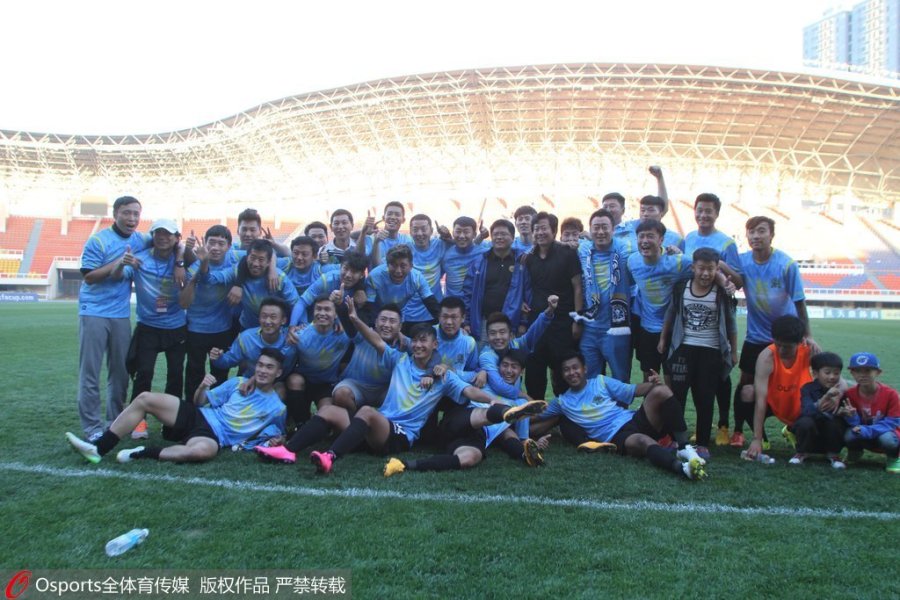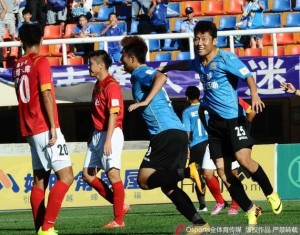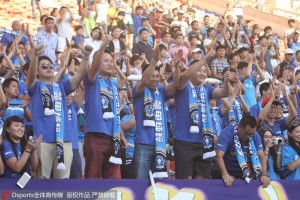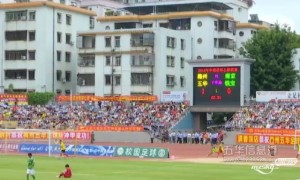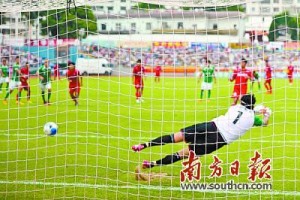Dalian Transcendence and Guangdong based Meizhou Wuhua secured promotion to League One with comfortable victories in their League Two semi-final play-offs. Transcendence overcame Sichuan Longfor 5-2 on aggregate, while Meizhou trumped Nanjing Qianbao by an even more convincing 6-1 scoreline over two legs.
With League Two’s sixteen clubs split into northern and southern divisions, an eight team play-off is used to determine which two sides ascend into the second tier of Chinese football. Transcendence and Meizhou both finished top of their regional leagues, and so it is fitting that each club should come through the playoffs unscathed.
Transcendence had gone unbeaten across their fourteen league games, winning ten, and made it to the playoff semi-finals courtesy of a 3-0 aggregate win over Lijiang Jiayunhao. Despite losing two of their league games, Meizhou were able to top the southern division and breezed past Tianjin Locomotive 6-2 in their two-legged quarter-final tie.
Both clubs faced away trips for the first leg of their semi-final ties, but fared very differently on their travels. Goals from Ba Dun, Yu Jianfeng, Chen Jianlong and a Gao Zhilin brace gave Meizhou a 5-1 victory that all but guaranteed their passage, while Transcendence faced a potentially more nervy second leg following a 0-0 draw in Nanjing.
In the event, Transcendence had little to worry about as a double from Nan Yunqi was added to by strikes from Han Jiabao, Hu Zhaojun and Wangguang Hao in a comfortable 5-2 win. Meizhou were only able to muster a Cao Tianbao penalty in their second leg 1-0 victory, but it mattered little as they had done all the hard work at Longfor’s home stadium in Mianyang.
The two teams will now face each other in a one off final at Transcendence’s Jinzhou Stadium on October 10th to determine the League Two champions. But the significance of that showdown’s outcome pales in comparison to what each of these young clubs has already achieved.
Dalian Transcendence
This is only Transcendence’s second season as a football club. They were formed in 2013 after the disappearance of legendary Chinese club Dalian Shide who won eight league titles since 1994. That record makes Shide the most successful club in China’s professional era, but they were acquired by city new boys Dalian Aerbin in 2012 after running into severe financial difficulties.
With many of Shide’s famous “Blue Wave” supporters unwilling to follow Aerbin, Transcendence were set up as an alternative and competed in the 2014 League Two season. That year they finished third in the northern division before being eliminated on away goals in their quarter-final tie with Guizhou Zhicheng.
Transcendence’s squad features a number of players made superfluous by Aerbin’s acquisition of Shide, with this season’s leading goalscorers Quan Heng and Han Jiabao having arrived from Aerbin and Shide, respectively. The club attracted some degree of national attention in May when they almost beat then Super League leaders Shanghai SIPG in the CFA Cup third round.
The performance of centre back Zhao Yibo particularly stood out on that occasion, but Transcendence head coach Liu Zhongchang is under no illusions about the need for his side to improve before next season. Liu credited a core of twelve or thirteen players for achieving this promotion, and there is no doubt they will need to strengthen the depth of the squad in order to compete next season.
One final thing worth mentioning is the tantalising prospect of a Dalian derby next season. As Aerbin’s push for promotion back to the Super League falters, a potentially fascinating dynamic appears on the horizon.
Dalian football fans had been deserting Aerbin in droves until Yifang invested in the club in the summer. Yifang is part owned by Wanda who bankrolled Shide’s success and many supporters have clearly felt better able to identify with Aerbin since that cash injection took place. Attendances that had fallen below 4,000 swelled to over 42,000 for the visit of Yanbian Changbaishan a couple of weeks ago, and it will be interesting to see where fans loyalties lie with Shide’s spiritual successor now in the second tier.
Meizhou Wuhua
In comparison to Transcendence, Meizhou are League Two veterans having played their first season in 2013. They finished top of the southern division their debut year and repeated the feat in 2014, only to fall in the knockout stages on both occasions.
In 2013 it was a Wang Dong inspired Shandong Tengding that knocked them out 3-2 on aggregate in the quarter-finals. Meizhou made it one step further a year later, but fell by the same scoreline to eventual champions Jiangxi Liansheng at the semi-final stage.
That was particularly heartbreaking for Meizhou as Jiangxi scored two away goals in the last eight minutes of the second leg to go through. Even more galling was the fact that they lost an apparently meaningless third placed playoff to Guizhou Zhicheng, only to see their opponents promoted to League One the following February thanks to the financial collapse of Shenyang Zhongze.
Wuhua may be a relatively new club, but the Meizhou region of Guangdong has a rich footballing tradition. The club may only play in the 8,000 seat Wuhua County Stadium, but they have an excellent training base which rivals that of many Super League clubs.
With League One side Guangdong Sunray Cave relocating to Xi’an and then disappearing altogether at the end of last season, Meizhou are now the third side in Guangdong after Super League behemoths Guangzhou Evergrande and Guangzhou R&F. The benefit of this is that the club has been able to recruit many native Guangdong players who were either not good enough to make the cut at Evergrande or were left without employment when Sunray Cave went down the tubes.
The likes of midfielder Gao Zhilin and centre back Tang Dechao were on the fringes of Evergrande’s title winning squads of 2011 and 2012 and two-thirds of the entire playing staff are Guangdong natives. They are complimented by the likes of Yang He, who arrived from Changchun Yatai in the winter after scoring one of the goals that knocked Meizhou out of last season’s playoffs while on loan at Jiangxi, and striker Cao Tianbao.
33-year-old Cao was released by Changchun at the end of last season after a long career that has saw him win the Super League in 2007 and earn an international cap in 2009. He arrived in the summer alongside Tang, who signed from Henan Jianye, and 21-year-old midfielder Ba Dun who came in on loan from Beijing Guo’an.
Remarkably, Meizhou underwent three managerial changes this season before settling on current boss Qi Wusheng in July. The 71-year-old veteran coached the Chinese national team in the 90s and leads a squad ambitiously aiming for a top half finish next season according to those at the club.
However, there is still some uncertainty over the club’s future. Their stadium may regularly be more than half full, but it’s tiny by comparison to other grounds in the top two divisions. Indeed, the location of the stadium in Wuhua county, 90 minutes away from the nearest airport, means that Meizhou will be the only League One or Super League team based in a county level city.
This has inevitably led to speculation that the club could move to Guangzhou or be picked up by wealthy investors looking to put a League One team in a larger city. Just last season, Taiyuan Zhongyou were relocated to Hohhot after winning promotion to League One, so such a move would not be without precedent.
As it stands, though, Meizhou Wuhua will play Dalian Transcendence on October 10th as a precursor to a 2016 League One fixture. But, considering what happened last season, it might be worth paying more attention to the third placed playoff taking place on the same day between Nanjing Qianbao and Sichuan Longfor. Given the unpredictability of Chinese football, that game could still turn out to be for more than just a bronze medal.
